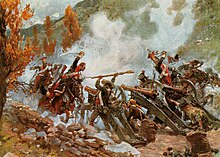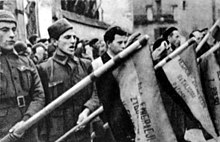|
Polaco (slur)Polaco (lit. 'Pole') is a derogatory term used in Spain to refer to a Catalan person. Its etymological origins are uncertain, and all existing theories are speculative, usually based on the fact that the same word also refers to Polish people. The term is primarily used in Madrid and the regions bordering Catalonia. Although rarely found in literature, it is common in colloquial speech, particularly during sporting events. Within Catalonia, the term has been reclaimed in some contexts, used without its derogatory connotations to differentiate Catalans from other Spaniards. The term is generally unknown in Poland. Antecedents Historically the term "polacos" has been twice used in Spanish as an abuse or smear. In the late 18th century the name was applied to followers of one of two Madrid drama schools; in theatrical auditoria they used to trade insults with a competitive group, named "chorizos". The name allegedly stemmed from a cleric known as Padre Polaco, who used to lead his band.[1] Both groupings were revived almost a century later with a popular zarzuela of Luis Mariano de Larra Chorizos y polacos (1876);[2] the title immortalized both names, though there is no indication that they were used beyond the theatrical realm or had anything to do with Catalonia.[3] Once more the term "polacos" emerged against an entirely different background in the mid-1850s; the name was applied to a faction of Partido Moderado. The grouping was led by Luis José Sartorius, a politician erroneously supposed to be of Polish origin.[4] Because of the way the group operated, the terms "polacada", "polaquería" and "polaquísmo" soon started to stand for favoritism, cronyism and arbitrary personal decisions; the term "polaco" denoted a member of a clientelist political network.[5] The name disappeared from public usage following Sartorius’ death, yet it enjoyed temporary revival in the 1880s[6] and made it from the press to literature appearing in Miau, a novel of Benito Pérez Galdós (1888).[7] The term "polacada" barely survived in Spanish until today, in dictionaries defined as "an act of favoritism";[8] when denoting a crony the word "polaco" disappeared entirely. One more episode of Poland-related naming practice occurred during the lifetime of the First Spanish Republic. Few liberal politicians dubbed Spain "Poland of the South"; the term was by no means derogatory and it was supposed to suggest that like Poland in the late 18th century, Spain faced a threat of a foreign reactionary intervention. The name was not anyhow related to Catalonia; adopted only among a small circle of liberal intellectuals it was used in the 1870s and did not make it as a commonly used reference.[9] Origins Origins of the anti-Catalan usage of "polacos" are obscure.[10] The theories striving to clarify the issue are abundant, yet they are all purely speculative and can hardly be verified. The most far-reaching hypothesis claims that supposed 17th-century merchant relations between Catalonia and Poland proved fertile soil for growth of ethnic stereotypes.[11] Another theory points to the 18th-century theatrical debate, though it provides no clue as to the Catalan link.[12] One more idea is about Polish soldiers fighting in Spain and by enemies confused with their Catalan allies; specifically some point to the War of Succession,[13] some to the Peninsular War[14] and some to the French intervention of 1823.[15] There is a concept which reverts to Sartorius; his supposed Catalan cronies was allegedly the reason why the name was applied to the Catalans.[16] Some authors dwell upon perceived parallelism between the Polish independence movement of the late 19th century and the emergent Catalan[17] or Basque[18] nationalisms. Divided between France and Spain, Catalonia – the theory goes – resembled Poland, the country divided between Germany, Austria and Russia;[19] another version is that Catalan deputies to the Cortes were dubbed "Poles" because of their national exaltation.[20] Few suggest that the derogatory term was exported to Spain by the Prussians.[21] Others point to the Civil War period, when allegedly Nationalist soldiers on the Aragon front confused the Polish International Brigades volunteers with the Catalan Republican belligerents.[22] One more group of students claim that the victorious Nationalists pledged to wipe out Catalonia from the maps just like the Germans did in case of Poland in 1939.[23] A fairly popular thesis partially supported by evidence is that the insult emerged during Francoism[24] as part of the barrack argot; the reference to Poland was casual[25] and the term was to stigmatize Catalan recruits as "alien".[26] There is a group of theories which do not refer to any point in time but bank on presumed similarities between the Catalans and the Poles, be it linguistic ("slurping" sound of the language),[27] religious (black Madonnas of Częstochowa and Montserrat)[28] or other (both nations are supposedly stingy).[29] Usage While some derogatory terms for Catalans exist in modern Spanish, such as "catalufos," "catalinos," and "catalardos," none of them match the prevalence of "polacos."[30] Considered by some a classic form of anti-Catalan sentiment,[31] the term is undeniably derogatory, though its intent can range from mildly patronizing to ironic or overtly hostile. The origin of the term is obscure. Any original meaning has been lost, with the word now firmly entrenched as a slur. While insults like "catalufos" or "catalardos" are frequently used in politically charged contexts against perceived Catalan separatists, "polacos" has broader usage. Geographically, the term can be heard throughout Spain, including regions far from Catalonia, such as Andalusia,[32] though it remains especially common in Madrid. It is also frequently used in regions neighboring Catalonia, such as the Balearic Islands,[33] Valencia,[34] and Aragon.[35] In Aragon, it is frequently directed towards residents of La Franja, the Catalan-speaking border region.[36] "Polacos" is primarily used in spoken Spanish, although it occasionally appears in writing, particularly on social media.[37] Though characteristic of informal speech, it is sometimes found in literature.[38] The term is generally used in the plural form and is often directed at a Catalan audience, either directly or indirectly, such as during confrontations. Currently, its most recognized use is in chants at sporting events, particularly by fans of teams opposing FC Barcelona. The chant "es polaco el que no bote"[39] ("he who doesn't jump is a polaco") has become a ritual at Real Madrid home games. Instances of public figures using the term, such as playwright Antonio Gala Velasco[40] and sports manager Ramón Mendoza Fontela,[41] typically attract media attention. Reception in Catalonia Among the Catalans there is a general degree of awareness of the abusive role of the term "polacos" in Spanish. Their own response might fall into one of chiefly four categories. The one which because of its verbal and on the fly background is most difficult to document is indignation.[42] Another – a fairly popular one – is about ignoring or eradicating the abusive intention; instead, the term is assigned a neutral, favorable or even proud flavor. A TV survey on the streets of Barcelona seems to demonstrate that the city dwellers are scarcely troubled by the word, and some of them speculate about Catalan and Polish comparisons related to such values as patriotism, national pride or solidarity.[43] Some nationalist Catalan politicians, like Oriol Junqueras Vies, underline what they believe to be attractive features rendering the two nations alike.[44] One more type of response, made popular by TV, is turning the term into a paradigm of general political ridicule. This is how the term "polacos" is positioned by a satirical show Polònia, aired since 2006 by regional public Catalan channel TV3. Often banking on caricature Polish references, the broadcast provides a mocking commentary to ongoing political events in Spain and has proved to be a commercial success. In 2008 a sports-related and similarly formatted spin-off was launched, named Crackovia (a pun on Polish city Cracow and "crack", or sports ace). The word "polacos" has also filtered into the Catalan language, though it lost its double designation; at times and when self-defining themselves against the background of Catalan-Spanish skirmishes the Catalans use the word "polacs", while another word "polonesos" stands for the Poles.[45] Reception among Poles Although the derogatory use of "polacos" is not widely known in Poland,[46] it is occasionally reported in the media. These reports often downplay or deny the offensive nature of the term.[47] For example, an official publication from the Warsaw Ministry of Foreign Affairs merely stated that "in Catalonia, the Poles are approached with particular sympathy, since inhabitants of the region are traditionally nicknamed polacos."[48] News reports about "polacos" sometimes speculate on Poland being a model for Catalonia, with headlines like "Catalans are proud to be Poles."[49] Some authors portray the derogatory use as a relic of the Franco era, emphasizing supposed Catalan admiration for Poland stemming from factors like popular Polish cartoons for kids, esteemed Polish writers, and a revered Polish history.[50] The topic of Catalans being inspired by Polish patriotism, independence movements, resistance against oppression, and the contribution of Polish interbrigadistas during the Spanish Civil War occasionally surfaces in Polish online discussions.[51] Reports that clearly identify "polacos" as a "pejorative-ironic" and frequently used slur are less common,[52] usually appearing in discussions about the Real Madrid-FC Barcelona rivalry.[53] With the recent increase in Polish migration to Spain, including Catalonia, some Poles have encountered this usage. Like the Polish media, they often downplay its offensiveness, sometimes treating it humorously, such as by introducing themselves as "Polacos de Polonia" ("Poles from Poland").[54] A website run by Polish people from Barcelona describes the term as "slightly pejorative," but also "colloquial" and "with a slight wink."[55] However, some Poles react angrily, condemning the term as an insult to the entire Polish nation.[56] See alsoFootnotes
Further reading
|
Portal di Ensiklopedia Dunia


